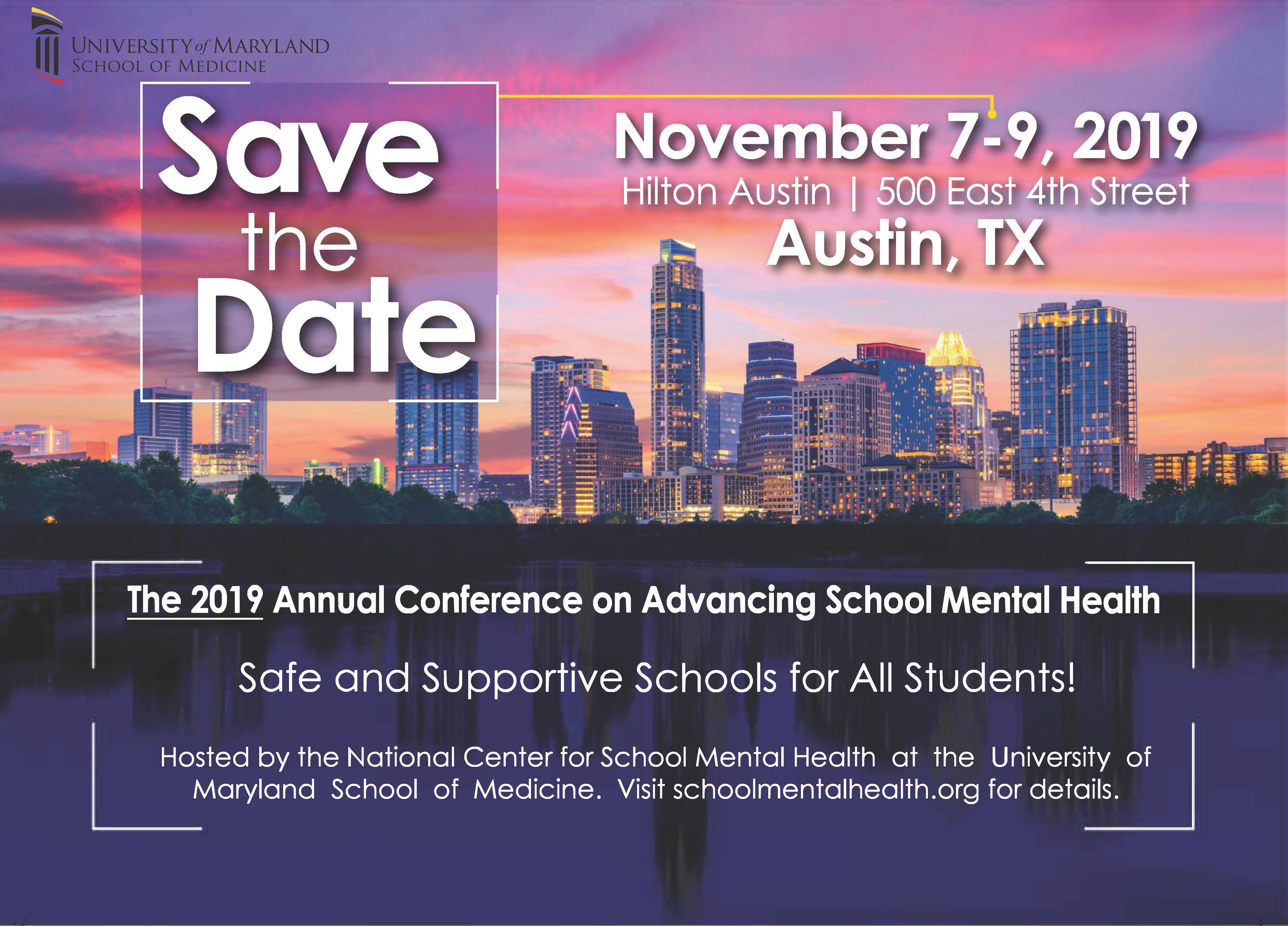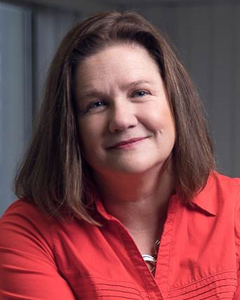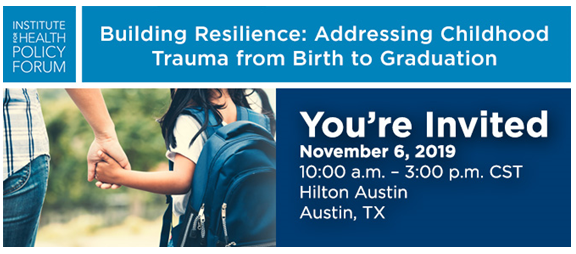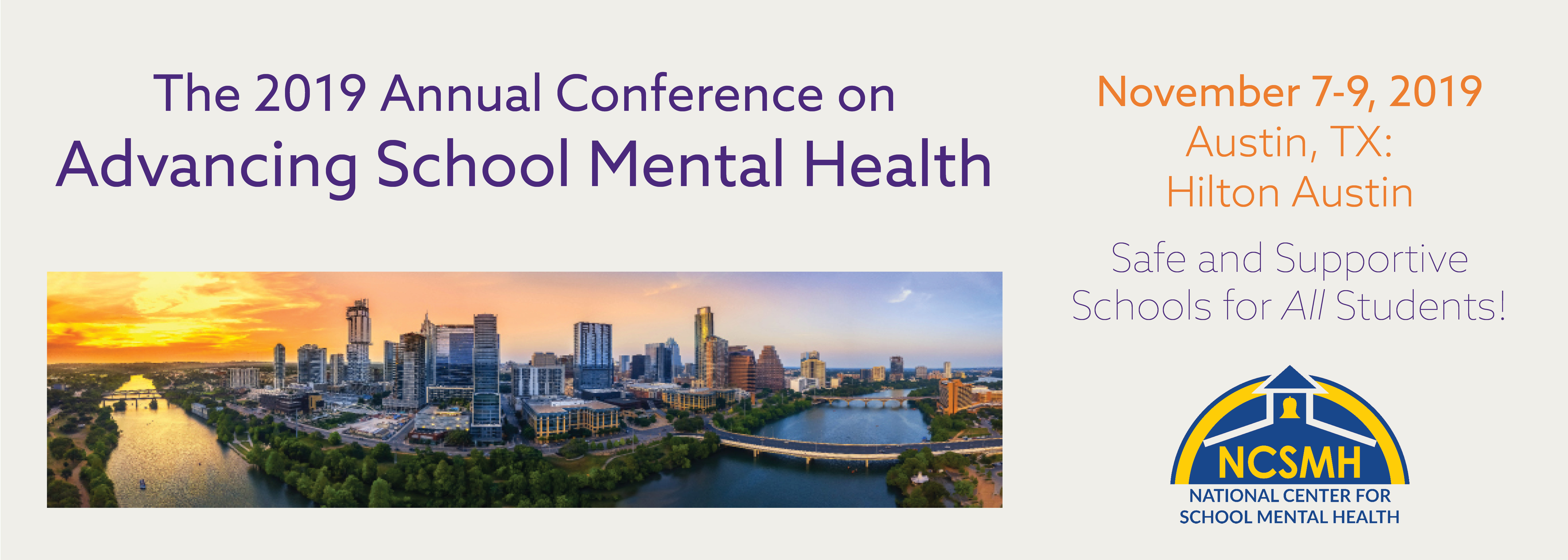2019 Annual Conference on Advancing School Mental Health
2019 Annual Conference on Advancing School Mental Health: Safe and Supportive Schools for All Students
November 7-9, 2019

The 2019 Advancing School Mental Health conference, November 7-9, 2019, at the Downtown Hilton Hotel, in Austin, Texas is the nation’s premier interdisciplinary conference on school mental health! The conference brings together local, state, national, and international experts to advance knowledge and skills related to school mental health practice, research, training and policy. Conference attendees include educators, administrators, student instructional support personnel, health and mental health practitioners, family members, youth, policymakers, researchers, advocates, child-serving agency and organization staff.
Americans with Disabilities Act
If you require special accommodations to attend or participate in the 2019 Annual Conference, please provide information about your requirements to the National Center for School Mental Health (410-706-0980) at least 30 business days in advance of the event.
Conference Overview
The Annual Conference, the nation's premier interdisciplinary conference on school mental health, brings together local, state, national, and international experts to advance knowledge and skills related to school mental health practice, research, training, and policy. Follow this link for 2019 ASMH Conference General Information.
CONFERENCE OBJECTIVES
At the end of the conference, attendees will be able to:
1. Identify three strategies for effectively implementing a full continuum of integrated school mental health approaches to support students’ academic, behavioral, and social-emotional success.
2. List three evidence-based practices in school mental health.
3. Identify three action steps to meaningfully partner with youth and families in school mental health.
SPECIALTY TRACKS
1. School Climate and Universal Mental Health Promotion
2. Prevention and Early Intervention
3. Mental Health Intervention and Treatment
4. Implementation Drivers
5. Education-Mental Health Integration and Collaboration
6. Youth and Family Partnerships in Mental Health
7. Cultural Responsiveness and Equity
8. Advocacy and Policy
9. Financing and Sustainability
View our scrolling slides for more general information about the conference!
Conference Presentations
Thursday November 7, 2019
Conference Session 1
CS 1.01. A Brief Social Emotional Skills Assessment for Tier 2 Intervention: The ISP-Skills
CS 1.02. Adaptive Leadership Drives Implementation
CS 1.03. A Framework for Meaningful Youth Engagement
CS 1.04. Building Capacity of Rural School Personnel to Address Mental Health Ne
Handout(s): Building Capacity
CS 1.05. Building Mental Health Literate Schools, Districts, Communities
CS 1.06. City of Santa Monica Child and Youth Resource Teams-Collective Impact
CS 1.09. Educational Implications of Community Violence & Trauma
Handout(s): Case Example Questions
CS 1.10. Incorporating Substance Use Treatment into Schools
CS 1.12. Serving American Indian Youth with Academic and Behavioral Supports
CS 1.14. Sustainable Mental Health Programing
Handout(s): ESBH Directory
CS 1.15. Use What You Have, Start Where You Are Using Stress Reduction
Conference Session 2
CS 2.01. A County-Wide Three-Tiered Prevention to Intervention Model for School
CS 2.03. Causeway Galveston An Approach to Social and Emotional Learning
Handout(s): Causeway Gaveston Contact
CS 2.04. Comprehensive School-Based Suicide Prevention
Handout(s): Alignment PBIS Suicide Prevention
CS 2.05. COOL Zones Develop Children Who Are COOL, CALM, CHILL and SAFE
CS 2.06 Find Your Super Power Uniting HEROES to Create Safe & Supportive School
CS 2.07. Using National Guidance to Advance CSMHSs
CS 2.08. Health, Opioid Prevention, Education and Supports in Schools
CS 2.09. Implementing Effective Models of MTSS
CS 2.10 Lessons Learned from the Field when Engaging Young People
CS 2.11. Clinicians and Their Role in Restorative Discipline
CS 2.12. School Mental Health in the Ozarks What works, What doesn't.
CS 2.15. Using Data to Improve School Mental Health Service Access
Conference Session 3
CS 3.02 Building MTSS from the Ground Up
CS 3.03. Building up the Forgotten Tier
CS 3.04. How Social Networks and Teachers Social and Emotional Competence
CS 3.05. Mental Health from a School Safety Perspective
CS 3.06. Reaching Out, Reaching In Addressing Children’s Mental Health
CS 3.07. The Grieving Student Supporting Students Coping with Loss
Handout(s): Addressing Grief Tips for Teachers and Administrators, Bereavement Booklet, Do's and Don'ts, What Not to Say
CS 3.08 Using Trauma-Informed Strategies as Primary Prevention for Substance Use
Handout(s): SEOW
Topical Learning Sessions
Topical Session 1. Cultural Responsiveness and Equity
Handout(s): DAS ASMHC, Decision Making Tools
Topical Session 5. Youth and Family Partnerships in Mental Health
Topical Session 6. School Mental Health Policy
Conference Session 4
CS 4.01. A Brief Intervention Strategy for School Mental Health Clinicians
CS 4.03. A Cost and Cost-Effectiveness Analysis of Three Levels
CS 4.04. Best Practices in School Mental Health
CS 4.05. Character Strengths in the Classroom Effectiveness
CS 4.06. School-Based Mental Health Services Building Sustainability
CS 4.07. Compassion Resilience Toolkit Lessons Learned in a Statewide Roll-out
CS 4.08. Expanding Clinical Mental Health Services in North Texas
CS 4.09. Expanding Knowledge and Best Practices in SBMH Approaches
Handout(s): BINGO
CS 4.10. Facilitators and Barriers to Systems Change Lessons Learned
Handout(s): Community Schools Overview
CS 4.11. Fortifying the Backbone of Safe and Supportive Schools
CS 4.12. Indiana Social-Emotional Learning Competencies
CS 4.14. Promoting Implementation and Sustainment of Tier 2
CS 4.15. Supporting Culturally Relevant Evidence-Based Practices
Conference Session 5
CS 5.01. A Practical and Proven Solution to Implement SEL
Handout(s): Practical Proven SEL
CS 5.03. Assessment and Implementation of Community Based Mental Health Services
CS 5.04. Better Together! Eliminating Barriers to Whole Child Health
CS 5.05. Chicago Public Schools Healing Trauma Together Program
Handout(s): Professional Development Offerings, TESI, TRS-D Domains & Descriptors, HTT Infographic, TRS Tool
CS 5.07. Data-informed, Targeted Interventions for Improving Emotion Regulation
CS 5.08. Development of the TRAILS Coach Network Community Partnership
CS 5.09. Hurricane Harvey Recovery
CS 5.12. School Social Workers Operating at the Intersection
CS 5.13. School-Based Mental Health Services Integration in Rural Missouri
CS 5.14. Strengthening Tier 2 Trauma-Based Supports at the Elementary Level
Conference Session 6
CS 6.01. Building Our Superpowers
CS 6.02. Breaking Down the Barriers of Mental Health Crisis in the Schools
Handout(s): Counseling Services Referral Form, Procedures for School Based Counseling Referrals, Suicide Ideation Procedures
CS 6.04 Development of a Diagnostic Interview for with Intellectual Disabilities
CS 6.06. Guiding the Implementation Fidelity of a Team-based Tier 3 Supports
CS 6.07. Identifying and Removing Barriers: School-Based, Trauma-Focused Group
CS 6.08. Linkages A Model for Mental Health Education and Suicide Prevention
CS 6.12. Sustaining Collaboration Across Stakeholders to Promote School Health
CS 6.14. Promoting Partnerships between Schools and Community Providers
CS 6.15. Who Do I Want You to Be Racial Cultural Trauma in Schools
Friday November 8, 2019
Keynote
Symposia
S 01. Applications of Motivational Interviewing as a Core Component
S 02. Best Practices in the Implementation of Universal Screening
S 03. Culturally Responsive Mental Health Practice RAICES
S 04. Developing, Implementing, and Sustaining University-School Mental Health
S 06. Figuring out the Missing MTSS Puzzle Piece
S 07. Implementation Science-Based Technical Assistance: The MHTTC Network
Handout(s): MHTTC National School Mental Health Curriculum Overview
S 08. Innovations in Internalizing
S 09. Meeting Student Needs: Integrating Mental Health/Whole Child Goals
S 10. Mindfulness-Based Intervention in Schools
S 11. Research on Promoting School Safety by Addressing School Mental Health & Part 2
S 12. The Power of Relationships
S 13. Trauma-Informed Care in Schools
Handout(s): Project Summary, Responder Model Infographic, SRO Course Outline & Objectives
S 15. Where Education and Medicine Meet
Conference Session 7
CS 7.01. The Intersection of K-12 Education and Behavioral Health
CS 7.02. Building Community Partnerships with Family-Run Organizations
Handout(s): Family Engagement Resource , Regional FRO Listing for SAMHSA Administrator
CS 7.04. Creating the ‘House That Smiles’ - Optimizing School Climate
CS 7.05. Developing Systems as a Guide for Implementation
CS 7.06. Effectively Using Data to Select, Implement, and Evaluate Tier 2 System
Handout(s): Classroom Assessment, DDR Example, Intervention Decision Sheet
CS 7.07. Expanding Access Implementation and Funding Strategies
CS 7.09. Mental and Behavioral Health Roadmap and Toolkit for Schools
CS 7.10. How a Small Program Can Have a Big Impact
CS 7.11. Power of Sport in the Promotion of Student Achievement and Well-Being
CS 7.13. How Mental Health Conditions May Affect Student Teacher Success
CS 7.14. Cultivating Partnerships to Increase Academic Achievement
CS 7.15. Tools You Can Use Promoting Safe and Healthy Schools
Conference Session 8
CS 8.01. Advocating for School Start Time Changes
CS 8.02. Assessing Schoolwide Capacity
CS 8.03. Braiding SEL, Trauma-Informed Care and Restorative Practices
CS 8.06. Creative Ways to Engage Students and Teachers in Mental Health
CS 8.07. District-Wide Psychosocial Progress Monitoring
Handout(s): Therapy Goals & Service Delivery Checklist
CS 8.08. Engaging Families in School-Based Student Mental Health Support
CS 8.09. Making it Work at Tier 3 Lessons Learned from an Intensive Intervention
Handout(s): RENEW Implementation Checklist, RENEW Integrity checklist
CS 8.10 Preschool Expulsion Prevention Parent and Practitioner Perspectives
Handout(s): HB318 Summary
CS 8.11. RELATE: Building Positive Relationships to Reduce Racial Disparities
CS 8.12. Supporting ALL Students Through a Universal SEL Program
CS 8.13. Collaboration between Education, Mental Health and Families
CS 8.14. The TRAILS Dashboard A Web Application to Measure Outcomes
Conference Session 9
CS 9.01. Clinicians in Schools Moving from Learning to Leadership
CS 9.02. Designing a Trauma Sensitive Approach to a Student Conduct Policy
CS 9.03. Expansion of Tier II Mental Health Services
CS 9.04. MHTTC Network Strategies to Build CSMHSs
CS 9.05. Navigating the Implementation of a Successful Behavioral Health Team
CS 9.06. Promoting Mental Health Education in Schools through Legislation
CS 9.08. Reducing Stress in School A for Healthier Teachers, Students & Families
CS 9.09. Research on Promoting School Safety
CS 9.10. Schools and Communities Working Together to Support Student Well-Being
CS 9.11. Stigma Hurts, Awareness Helps Strategies and Lessons Learned
Handout(s): P2P Manual, Peer to Peer Depression GO Sheet
CS 9.12. Student Wellness Begins with Us
Handout(s): PROQOL
CS 9.13. Supporting Schools to Develop and Continuously Improve Tier 3
Conference Session 10
CS 10.01. A Longitudinal Study of Two Teacher-Report Screening Measures
CS 10.02. Applying Restorative Justice Principles to your Practice
Handout(s): Applying Restorative Justice Principles, Scenario
CS 10.05. Jogging Rather Than Running Shift of Crisis to Prevention in New York
CS 10.06. Safety and Support Begin at Home
CS 10.07. Strengthening Relationships to Strengthen Outcomes
CS 10.08. The Interconnected Systems Framework
CS 10.09. The Magnificent 7 Years of Advancing Behavior Health Services
CS 10.10. Why School is Not a Walk in the Park for Our Students
CS 10.11. Using Motivational Interviewing in School-based Programming with Youth
CS 10.12. Using the School Compassionate Culture Analytic Tool
CS 10.13. Utilizing Social Work and Behavior Consultation
Saturday Novemeber 9, 2019
Intensive Training
IT 02. An Overview of the Trust Based Relational Intervention
IT 03. Bears Share and Unicorns take their Medicine Metaphorical Stories
Handout(s): Metaphorical Storytelling
IT 04. FUERTE Curriculum Meeting the Needs of Immigrant Youth
IT 06. How Can We Trust Each Other Trust-Building Activities for Everyone
IT 07. Implementing Restorative Practices through a Multi-Tiered System
IT 09. Not Just Words Macro-Level Impact of Microaggressions
IT 10. Promoting Self-Regulation Skills in Adolescents
IT 11. The Best of Two Model Integrating a Home-Based Crisis Intervention
IT 12. Trauma Responsive Schools Race, Equity and Marginalized Students
Handout(s): ADDRESSING Tool, Resources, Self Care, Speak up Pocket Card
Conference session 11
CS 11.01 An Environmental Walk One School Commitment
CS 11.02 Implementing a Universal SEL Screener and Using a Data Framework
CS 11.03 Professional Development That Matters
Conference Session 12
CS 12.01 Increasing Mental Health Supports through Community Partnerships
Handout(s): Component Standards Matrix, Measuring SECD Toolkit, Resources & Other Information
CS 12.02 Georgia State-level policy, legislation, and programming
CS 12.03 Surviving or Thriving Educator Coping & Change Following a School-Based
Program Agenda
Transportation
Airport
Austin-Bergstrom International Airport
3600 Presidential Blvd.
Austin, Texas 78719
512-530-2242
Driving Directions from the Airport
From Austin-Bergstrom Airport: Exit the airport and take Highway 71 west approximately 5.5 miles to I-35. Merge onto I-35 North and take exit 234C. Turn left at the first stop light (6th Street). Travel west on 6th street for four blocks. Turn left onto Neches. The Hilton Austin Hotel is on the left on the corner of 5th & Neches.
Transportation
Transportation from Austin-Bergstrom International Airport to and from the Hilton is available with SuperShuttle “Shared Ride” (discount code AK5YK) or ExecuCar “Private Sedan/SUV”.
Make reservations at www.SuperShuttle.com or www.ExecuCar.com use code HILTN for a 5% discount off published online fare.
Distance from Hotel: 7 miles
Drive Time: 15 minutes
Type & Typical Minumum Charge
Bus Service: 1.75 USD
Limousine: Fees vary. Contact hotel.
Super Shuttle: 16.00 USD
Rental Car: Fees vary.
Taxi: 30.00 USD
Contact Hours
Continuing Education Credit Offered
Counselors: For counselors seeking CE credit, The Institute for Continuing Education will submit a co-sponsorship application to NBCC for this program. Not all sessions may be approved for counseling CE credit. The CE materials received at the time of check-in at the CE desk will indicate any non-approved sessions.
New York: The New York State Education Department’s State Board recognizes the Institute for Continuing Education for Mental Health Practitioners as an approved provider of continuing education for licensed mental health counselors. Provider MHC-0016.
Ohio: The Ohio Counselor, Social Worker Board, Provider RCS 030001 recognize the Institute for Continuing Education as a provider of continuing education.
Florida: The Florida Dept. Health, Division of Counseling, Social Work, MFT, Provider BAP 255, expiration 03/2019, recognize the Institute for Continuing Education as a provider of continuing education.
Educators/Teachers: Texas teachers, school counselors, school mental health professionals, administrators and others who have an educator certification are eligible to receive up to a total of 24.5 hours of continuing education credit, including the preconference (7.5 hours) and conference (17.00 hours) awarded by the Texas Education Agency towards the renewal of their education certification.
Health Educators: Sponsored by the National Center for School Mental Health / University of Maryland School of Medicine, a designated a provider of continuing education contact hours (CECH) in health education by the National Commission for Health Education Credentialing, Inc. This program is designated for Certified Health Education Specialists (CHES) and/or Master Certified Health Education Specialists (MCHES) to receive up to total of 17 entry-level CECH. Therefore, an attendee can earn up to 17.0 total Category I continuing education contact hours.
Marriage-Family Therapists: The Florida Dept. Health, Division of Counseling, Social Work, MFT, as a provider of continuing education, Provider BAP 255, expiration 03/2019, recognize the Institute for Continuing Education.
New York MFT: The Institute for Continuing Education is recognized by the New York State Education Department's State Board for Mental Health Practitioners as an approved provider of continuing education for Licensed Marriage and Family Therapists. Provider MFT-0012.
Ohio: Provider RTX 100501.
Texas: The Texas State Board of Examiners of Marriage and Family Therapy, Provider 177 recognize the Institute for Continuing Education as a provider of continuing education.
California Professionals: The Institute for Continuing Education, Provider 56590, is approved by the California Association of Marriage and Family Therapists to sponsor continuing education for LMFTs, LCSWs, LPCCs. The Institute for Continuing Education maintains responsibility for this program and its content. This Course meets the qualifications for up to 18.00 hours of continuing education credit for LMFTs, LCSWs, LPCC, as required by the California Board of Behavioral Sciences.
Nurses: The Institute for Continuing Education is recognized as a provider of continuing education in nursing by the California Board of Nursing, Provider 12646. It is the responsibility of nurses to deteremine if the regulationg of their licesning/certification board accept CE hours awarded by an approved CE provider of the CA board of nursing.
Occupational Therapists: The AOTA is pleased to confirm approval of University of Maryland School of Medicine, the National Center for School Mental Health as an AOTA Approved Single Course Provider of continuing education, and to assign 2.5 AOTA CEUs the conference. “The assignment of AOTA CEUs does not imply endorsement of specific course content, products, or clinical procedures by AOTA.” As part of the American Occupational Therapy Association (AOTA)’s Approved Provider Program – Single Course Approval, AOTA is requesting that participants of this course complete a short online survey about your continuing education experience with our organization as an AOTA Approved Single Course Provider. Completing this survey will also enter you into a quarterly drawing for a $100 voucher for AOTA publications or CE. To access the survey go to https://surveys.aota.org/s3/APP-Single-Course-Provider-CE-Survey.
Physicians: The University of Maryland School of Medicine is accredited by the Accreditation Council for Continuing Medical Education to provide continuing medical education for physicians. The University of Maryland School of Medicine designates this Live activity for a maximum of 16.75 AMA PRA Category 1 Credits™. Physicians should claim only the credit commensurate with the extent of their participation in the activity. This continuing medical education (CME) activity is conditionally approved and will be certified for AMA PRA Category 1 Credit™.
Psychologists: The Institute for Continuing Education is approved by the American Psychological Association (APA) to sponsor continuing education for psychologists. The Institute for Continuing Education maintains responsibility for this program and its content. Not all sessions may be approved for psychology credit. The CE materials received at the time of check-in at the CE desk will indicate any non-approved sessions.
Social Workers: The Association of Social Work Boards (ASWB), www.aswb.org, through the Approved Continuing Education (ACE) program, approves the Institute for Continuing Education, provider #1007, as a provider for social work continuing education. The Institute for Continuing Education maintains responsibility for the program. ASWB Approval Period: 4-13-2018 - 4-13-2021. Social workers should contact their regulatory board to determine course approval. Social workers participating in this program may receive up to 18.00 clinical continuing education contact hours. Not all sessions may be approved for social work credit. The CE materials received at the time of check-in at the CE desk will indicate any non-approved sessions.
New York: The New York State Education Department’s State Board recognizes the Institute for Continuing Education for Social Work as an approved provider of continuing education for licensed social workers. Provider No. SW-0025.
Ohio: Counseling and Social Work Board, Provider RCS 030001.
Florida Dept. Health, Division Social Work, MFT, Counseling, Provider BAP 255, expiration 03/2019.
New Jersey: CE credit is not offered for New Jersey social workers.
Skill Level: Due to the interdisciplinary nature of this Conference, sessions have not been rated for skill level (beginning, intermediate, advanced). Participants are urged to review session description for appropriateness for professional and personal development.
Instruction Methodology: May include lecture, audio-visual, demonstration, experiential practice of techniques, large and small group discussion.
Non-Credit Activities: Credit is not offered for breakfast, luncheon, dinner, social events, poster sessions, networking sessions, tour activities. If you have questions, contact The Institute for Continuing Education, instconted@aol.com.
Ethics Hours / Academic Credit: The Conference offers no “academic” credit and CE hours awarded are not eligible toward fulfillment of a degree. No “ethics” hours are offered.
ADA: For accommodations based on disability, please contact: Shuntley@som.umaryland.edu.
TOTAL CE HOURS SUMMARY
Wednesday, November 6: 7.50 hrs
Thursday, November 7: 7.00 hrs
Friday, November 8: 6.50 hrs
Saturday, November 9: 3.50 hrs
TOTAL POSSIBLE CONTACT HOURS: 24.50 hrs
Conference App
All information, include the full schedule, list of presenters, and relevant links to resources and local events can be found in our 2019 Mobile App. Download the 2019 Conference App Instructions for step-by-step directions to find, install, and log in!
Youth Leadership Summit
Do you know (or are you) a youth leader who wants to network and learn more about mental health in schools? Apply to our Youth Leadership Summit by midnight on October 25! View our Youth Leadership Summit Flyer for more information.
Call for Award Nominations
Sponsorship & Exhibition
ON-SITE EXHIBITOR REGISTRATION INFORMATION: Onsite Exhibitor Registration-please complete and bring to site.
For interested exhibitors, view our 2019 ASMH Exhibitor Registration Instructions or register as an ASMH exhibitor.
For interested sponsors, view our ASMH 2019 Sponsorship Levels.
For vendors, see our W9 form.
Presenters
The request for proposals is closed. Please email us at ncsmh@som.umaryland.edu or chuntley@som.umaryland.edu with any questions.
Keynotes

Thursday Keynote: Dr. Isaiah Pickens- Unlocking Potential: The Key to Transforming the Future of Our Youth.
Dr. Isaiah Pickens is the Chief Executive Officer at the UCLA-Duke Center for Child Traumatic Stress, and the founder of iOpening Enterprises.

Friday Keynote: Dr. Claire Crooks- Adapting Evidence-Based Practices for Specific Populations: The Intersection between Utilizing Effective Practices and Ensuring Fit and Relevancy.
Dr. Claire Crooks is the director of the Centre for School Mental Health and a professor at Western University in London, Ontario.
Pre-Conference Sessions
Annual School Mental Health Research Summit (invitation only)
This pre-conference summit, co-hosted by the NCSMH and the SMART Center, gathers a multi-disciplinary group of school mental health researchers to engage in highly interactive dialogue and problem-solving around current research efforts an innovations.
ABC Summit
The 4th Annual Summit on Advancing Behavioral Health Collaboratives will convene Texas educators, behavioral health professionals, and policymakers in a one-day event designed to showcase evidence-based practices for students with behavioral health needs and showcase exemplars of outstanding programs and practices happening throughout the state. With this year’s theme, Strong Schools: Advancing Wellness and Resiliency in Texas, the summit will feature PAX Good Behavior Game founder, Dennis Embry, and youth mental health advocate, Evan Transue, as well as two panel groups that will describe how they are building strong schools through exceptional school-community partnerships. The Texas Education Agency will also introduce Texas’ Project AWARE, an initiative that is increasing mental health awareness, promotion, and services in schools. View the Strong Schools Summit flyer, or Register today for the 4th Annual Summit on Advancing Behavioral Health Collaboratives | Strong Schools: Advancing Student Wellness and Resiliency in Texas
Kaiser Permanente Institute for Health Policy Forum
On November 6, the Kaiser Permanente Institute for Health Policy will host pre-conference meeting focused on addressing childhood trauma across the lifespan. This meeting will include Kaiser Permanente staff, advocates, researchers, practitioners, and policy leaders. Planning for this event is supported by the Healthy Schools Campaign and the Alliance for a Healthier Generation.
We are currently at capacity for advanced registration. A limited number of spots will be available for day-of registration. If you are interested, registration opens on November 6 at 9:00am CST in room 400/402.
Accommodations
The Hilton Austin in downtown Austin, TX
500 East Fourth Street, Austin, TX, 78701
512-482-8000
Reserve your room by following this link to the Hilton website. The discounted guest room rate is $239/night and includes in-room internet, access to the business center, and express check-in/check-out. Please note that reservations for the conference block at the Hilton may fill up before the deadline date! If so, see the overflow hotel below. Each individual must provide a credit card and one night’s room and tax as a deposit. If you make your reservation over the phone, provide the event name “Advancing School Mental Health Conference.” Rates cannot be changed at check-in or check-out for guests who do not identify the conference affiliation. Reservations must be received no later than 30 days prior to the arrival date, or by October 4, 2019. After this date, reservations or changes are accepted contingent on space and rate availability. For additional questions about the conference or registration, contact the NCSMH at 410-706-0980, or email Christina Huntley at chuntley@som.umaryland.edu.
Overflow Hotel
The Westin Austin Downtown
310 East 5th Street
Austin, TX, 78701
(512) 391-2333
The rate is $269 per night
Book your group rate for University of Maryland Mental Health Conference
Please note that rooms tend to fill up quickly, before the deadline date of October 16th. The hotel is approximately 10 miles from the airport and approximately two blocks from the host hotel. You may take an uber or a brisk walk to the host hotel.
Registration
Online registration is closed, but there is still space available to attend the conference! Download and complete the On-Site Registration Form. Bring the completed registration form with payment to the on-site table at the Hilton Austin Hotel. If you have any questions, please call Christina Huntley at 443-790-4066.
Refund Requests
All refund requests must be submitted in writing by email to Christina Huntley (Chuntley@som.umaryland.edu) by August 31, 2019. Refunds submitted prior to August 31, 2019 will be subject to a $75 administrative fee. No refunds will be provided for student and speaker registration. If an attendee does not cancel their registration in writing prior to the deadline date, they are still responsible for the registration fee. No refunds will be administered after August 31, 2019.
Annual Conferences List
2019 Annual Conference on Advancing School Mental Health-Austin, TX
2018 Annual Conference on Advancing School Mental Health-Las Vegas, NV
2017 Annual Conference on Advancing School Mental Health-Washington, DC
2016 Annual Conference on Advancing School Mental Health-San Diego, CA
2015 Annual Conference on Advancing School Mental Health-New Orleans, LA

